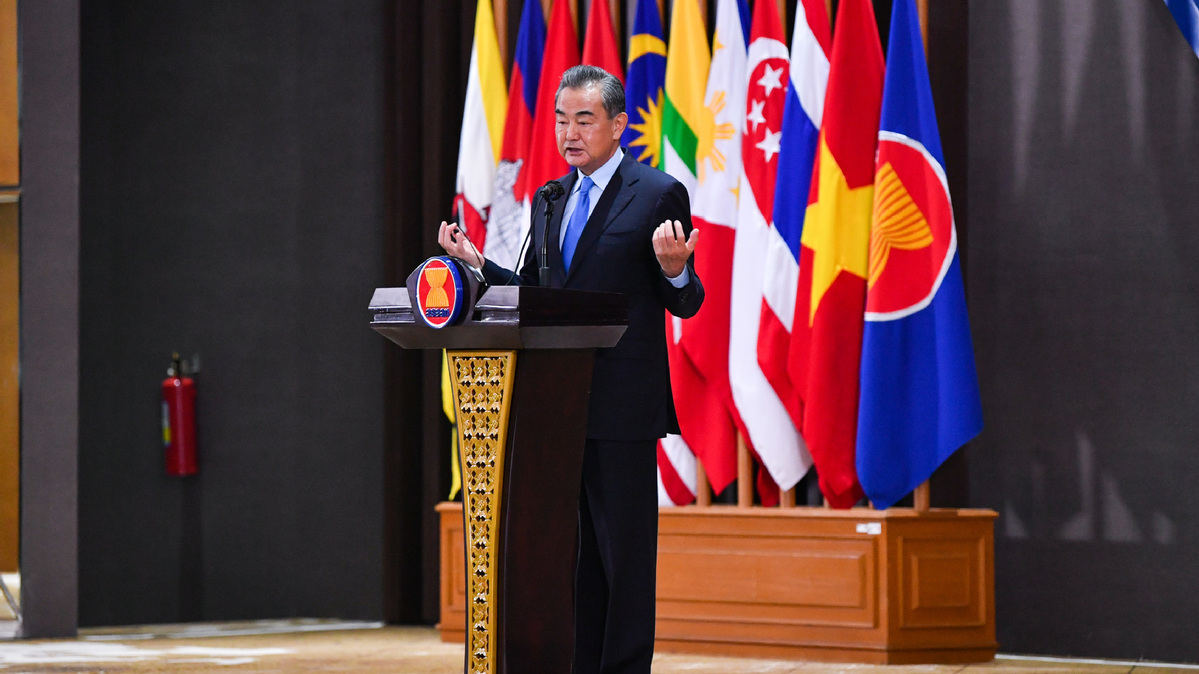
Chinese State Councilor and Foreign Minister Wang Yi makes a policy speech at the ASEAN Secretariat in Jakarta, Indonesia, July 11, 2022. [Photo/Xinhua]
By Hannan Hussain
Chinese State Councilor and Foreign Minister Wang Yi urged nations to uphold open regionalism and avoid being used as "chess pieces" in major-power rivalry when he spoke at the Association of Southeast Asian Nations (ASEAN) Secretariat on July 11. "It is necessary to continue to uphold independence, respect each other's sovereignty and core interests, [and the] leading role of ASEAN as a community to insulate this region from geopolitical calculations," he cautioned.
China's senior diplomat has a very valid point. Southeast Asia is a witness to ominous international trends in coercion, camp politics and bloc confrontation. Specific manifestations are an Indo-Pacific military strategy and security groupings. Beijing's focus on insulating the region from "hegemony and bullying" is a move towards safeguarding ASEAN's time-tested commitment to non-interference, ensuring that the sovereignty and territorial integrity of all countries is valued in equal measure.
Countries at the center of bloc confrontation cannot be trusted to make those choices. They are not acquainted with the China-ASEAN experience on open regionalism and peaceful development that has boosted outstanding achievements and win-win partnerships.
Asia should determine its own future, and a complete pushback against foreign dictates is necessary to safeguard that autonomy. "The choice we make today determines where the path will take us from now on – openness or isolation, cooperation or confrontation, solidarity or division, progress or regression," Wang said.
The vast scope for advancing China-ASEAN security cooperation as well as integrated economic development underlines the strengths of the ASEAN-centered regional cooperation architecture. Wang has emphasized that disputes should be resolved through dialogue and consultation. However, it is a practice contrary to the tendency of external powers to "split the region into confrontational or exclusive groups."
ASEAN and China's belief in a shared Asian community is best guaranteed by open regionalism. Respect for each other's diverse systems of governance and core interests helps motivate consensus, as opposed to a "values-driven" enterprise. An Asia united in the face of geopolitical turbulence consciously chooses cooperation over confrontation, and solidarity over division.

Wang Yi (L) meets with ASEAN Secretary General Lim Jock Hoi at the ASEAN Secretariat in Jakarta, Indonesia, July 11, 2022. [Photo/Xinhua]
China's support for peace, development, independence and inclusiveness protects Asia from unfavorable alternatives. The result of championing openness and inclusivity in the region is equal representation among countries, irrespective of ideology, so that the legitimate security concerns of all countries are given priority.
That sense of peaceful coexistence blocks negative alternatives, such as sanctions, blockades or a humanitarian crisis in the region. Wang called the negative alternatives the results of "geopolitical conflicts or bloc confrontation" extending to Asia. The region must stand united in its principled opposition to unrest.
The China-ASEAN comprehensive strategic partnership represents what open regionalism can offer. Look at the immense increase in bilateral trade from three decades ago, joint confidence in a maritime code of conduct, and a nuclear weapon-free zone, where consensus-building prevails over the zero-sum game mentality. It is a marked departure from the veneer of regional cooperation endorsed by some powers that filter representation based on their own values, without any consideration for Asia's open and inclusive regional architecture.
Wang's speech shows the need for Asia to maintain its strategic autonomy on peace, development, independence and inclusiveness; the need to avoid getting sucked into the divisive politics of major power campaigning. ASEAN has a leading role to play in establishing that deterrence. Its approach to common interdependent goals with China and the non-interference principle is not tethered to foreign dictates, and remains transformational for safeguarding peace and independence in Asia.

 中文
中文



